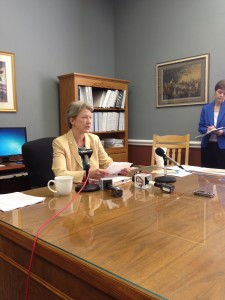JEFFERSON CITY, Mo. — With tensions rising between the Missouri legislature over a proposed tax reform bill passed by the General Assembly but vetoed by Gov. Jay Nixon, debates have raged, publicly, about the impact of changing sources of revenue for the state.
The impact that House Bill 253 could have on the state depends in part on the passage of a piece of federal legislation.

The Marketplace Fairness Act — which has been introduced in both chambers of Congress and has been debated but not passed for the past few years — would change the law with respect to the collection of sales taxes for online purchases.
The bill would allow states to collect sales taxes of online purchases made within the state even if the business is not physically located in Missouri. Under current Missouri law, most online purchases are not subject to a sales tax if the business in question does not have a brick and mortar location within state lines.
And while MFA deals with increasing revenue through sales taxes, HB 253 would decrease Missourian’s personal income tax levels by half a percent if congress passed it.
Linda Luebbering, Gov. Jay Nixon’s Budget Director, said this would ultimately be a “dangerous” blow to Missouri’s revenue and ability to provide services. Republicans have argued that the new sales tax and accompanying personal income reduction would be more or less revenue neutral.
“[HB 253] says that if they pass the Marketplace Fairness Act, our state does a half-percent reduction in personal income tax, and it happens immediately,” Luebbering said in an interview with The Missouri Times. “But it also allows people to collect refunds for any of the three previous years. That is a major hit to our revenue.”
Luebbering’s interpretation of the reduction in individual income taxes is not shared by some members of the Republican supermajority. Sen. Will Kraus, R-Kansas City, who sponsored the Senate Committee Substitute for HB 253 and is the Senate Ways and Means Committee Chair, said it was never the intention to allow Missourians to collect refunds from previous years.
“It would appear that that is the governor’s interpretation of what this bill does, but I can assure you that it was never the intention of those of us working on the bill to allow that,” Kraus said. “And if there were ever a court case or anything like that, the standard is looking at the intent of the bill, and that wasn’t our intent. I don’t see where in this legislation it allows for people to go back and collect taxes from other years.”

A half-percent reduction in personal income tax amounts to about $300 million less revenue for the state annually, Luebbering said. If the law ultimately allows people to collect refunds from previous years, the impact could exceed $1 billion, but Kraus said this is not a major concern.
“I think it’s a lot easier for the Governor and his staff to oppose a bill if they can say ‘hey look this is going to cut a billion dollars next year’ even if that’s not the most accurate picture of the situation,” Kraus said.
While both sides debate whether the reduction in personal income taxes that would accompany passage of the MFA would allow for such a large collection of refunds, they also don’t seem to agree on what the overall impact of the new revenue from the MFA. Kraus said that Gov. Nixon supported the MFA, but that Republican lawmakers wanted a new sales tax increase to be offset as much as possible by additional reductions in personal income tax levels. Nixon’s approval of the MFA was echoed by Luebbering.
“[The MFA] is harmless without [House Bill] 253,” Luebbering said. “It would probably be a net gain for our state, but with this language about income tax reduction trigged by it passing, we have a whole different scenario.”
Language similar to the MFA moved through the U.S. Senate earlier this spring as an amendment on the budget and, according to the Wall Street Journal and Forbes magazine, largely was intended by bill sponsor Sen. Mike Enzi, R-WY, to signal the bipartisan support for the bill.
While the fiscal note attached to the bill, along with accompanying studies, say the new sales taxes could generate a total of $200 million or more in new revenue, only about $80 million would be available in the general revenue fund, according to information provided by the budget office.
Kraus said that increased revenue, whether in the general revenue fund or looked at broadly as a total increase, was still more likely to bring growth into the state. He also said that the intention in tying a decrease in personal income taxes with a new internet sales tax was to keep the tax burden on Missourians as neutral as possible.
The average Missourian pays a sales tax of about 7.725 cents, the state sales tax being 4.225 and the average local sales tax being 3.5 cents. Of the 4.225 collected by the state, about 3 cents is collected by the general revenue fund. The remainder is placed into funds for earmarked programs like conservation, state parks and public schools.
“That [$200 million] number isn’t wrong,” Luebbering said. “But it’s not how much we would actually gain and be able to spend in our general revenue. That’s how much it would generate on the state and local levels combined, and general revenue doesn’t collect every single penny of sales tax revenue in the state — it just doesn’t.”
The veto session of the state legislature is slated for September, where the Republican-led House already has promised to attempt to override Nixon’s veto. Whether or not the votes are there is still uncertain. Kraus said he believes the Senate has the votes, but that in the House it will be an “uphill battle.”
Collin Reischman was the Managing Editor for The Missouri Times, and a graduate of Webster University with a Bachelor of Arts in Journalism.




